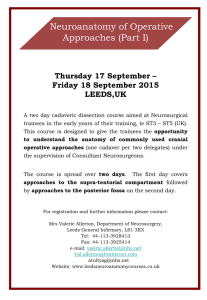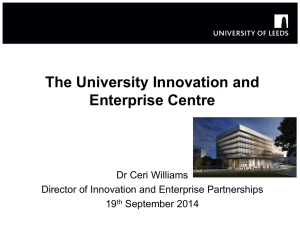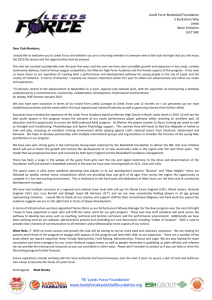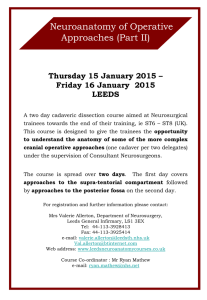Job Description
advertisement
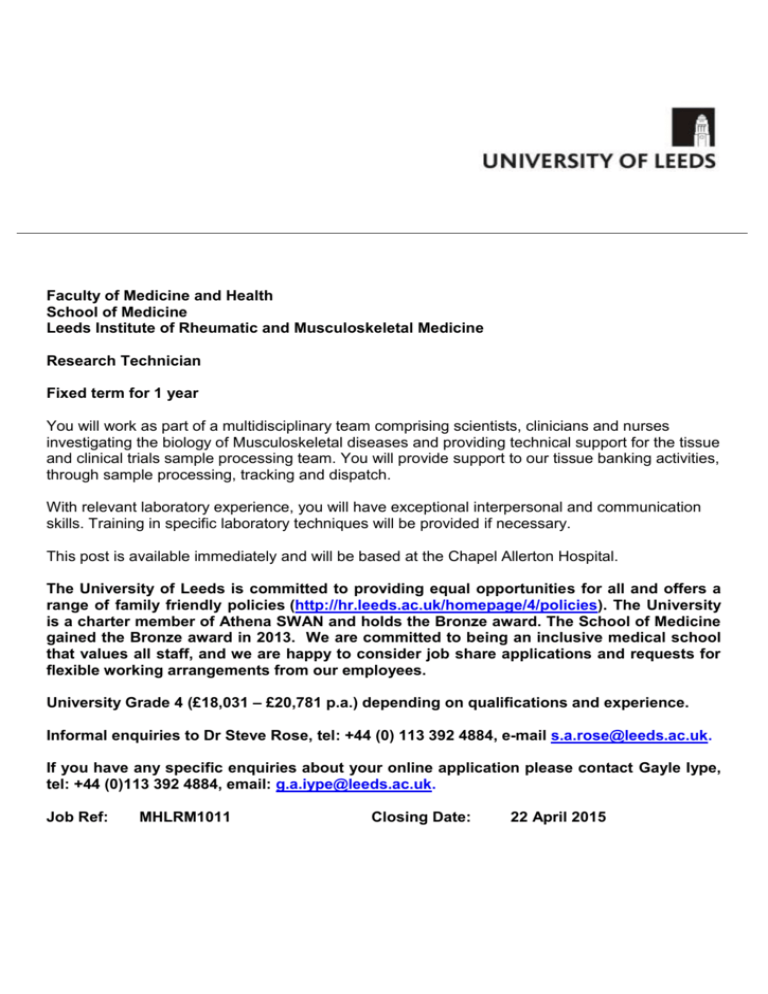
Faculty of Medicine and Health School of Medicine Leeds Institute of Rheumatic and Musculoskeletal Medicine Research Technician Fixed term for 1 year You will work as part of a multidisciplinary team comprising scientists, clinicians and nurses investigating the biology of Musculoskeletal diseases and providing technical support for the tissue and clinical trials sample processing team. You will provide support to our tissue banking activities, through sample processing, tracking and dispatch. With relevant laboratory experience, you will have exceptional interpersonal and communication skills. Training in specific laboratory techniques will be provided if necessary. This post is available immediately and will be based at the Chapel Allerton Hospital. The University of Leeds is committed to providing equal opportunities for all and offers a range of family friendly policies (http://hr.leeds.ac.uk/homepage/4/policies). The University is a charter member of Athena SWAN and holds the Bronze award. The School of Medicine gained the Bronze award in 2013. We are committed to being an inclusive medical school that values all staff, and we are happy to consider job share applications and requests for flexible working arrangements from our employees. University Grade 4 (£18,031 – £20,781 p.a.) depending on qualifications and experience. Informal enquiries to Dr Steve Rose, tel: +44 (0) 113 392 4884, e-mail s.a.rose@leeds.ac.uk. If you have any specific enquiries about your online application please contact Gayle Iype, tel: +44 (0)113 392 4884, email: g.a.iype@leeds.ac.uk. Job Ref: MHLRM1011 Closing Date: 22 April 2015 Job Description Background to the Post Due to the number of clinical trials supported by the university research Labs based at Chapel Allerton Hospital, a junior technical post is required to help log, process and catalogue clinical blood and/or tissue samples. Purpose of the Post This post which is fixed term for 1 year is available to start immediately to provide technical support for sample processing within the Institute. Main Duties Isolate and store cells/serum/plasma/urine/DNA from patients’ blood and tissue samples (may include attendance in theatre to collect fresh samples when necessary) from different rheumatology clinics for both in-house and commercial research (the Division may be participating in between 25-35 studies concurrently) in compliance with Human Tissue Act regulations; this will involve liaising/coordinating with several members of the multidisciplinary team Catalogue samples both physically in appropriate storage conditions (-80, -150, etc.) and electronically via updating/maintaining databases tracking of samples. This will include use of our sample tracking software for compliance with Human Tissue Act. Prioritise processing of samples in order to maintain their integrity and to reduce preanalytical error Be flexible in order to ensure lab is manned when clinics are operating which may mean working on University holidays. Liaise with medical and nursing staff to coordinate processing of samples from all Clinical studies Track and record entry and exit of samples into the laboratory using computer based tracking Help research projects requiring sample preparation/extraction. Attend group, departmental and Institute meeting as required by the PI Maintain a clean and tidy environment in the laboratories Assist with other laboratory techniques as required You will occasionally be required to work outside normal working hours according to the needs of the projects and occasional at different labs within the Division (based at St James’ University Hospital) Where appropriate, assist others with the use of pieces of equipment in line with standard operating procedures. Contribute to the call-out rota for monitoring/managing HTA freezer equipment Relationships The post-holder is responsible to the Lab manager, Diane Corscadden in the Institute through whom he/she is accountable to the Business Manager, Dr Steve Rose, Head of Section, Dr Maya Buch and Head of Institute, Professor Paul Emery, the Dean of the Medical School and Faculty Professor Paul Stewart University Values All staff are expected to operate in line with the university’s values and standards, which work as an integral part of our strategy and set out the principles of how we work together. More information about the university’s strategy and values is available at http://www.leeds.ac.uk/comms/strategy/ Person Specification Essential Laboratory experience (research or routine) Experience in tissue handling/processing Experience in sample processing Previous experience working with complicated data, including the ability to record data with a high level of accuracy Evidence of the ability to work unsupervised and also work effectively as part of a research team Excellent time management and organisational skills Able (if needed) to work across sites (CAH and SJUH) Evidence of working flexibly to meet the needs of the business Effective interpersonal and communication skills Evidence of an ability to organise own work to meet deadlines The ability to record data with a high level of accuracy Excellent computer skills Willingness to learn new skills / attend training courses for continued professional development Awareness of Health and Safety requirements within a laboratory setting Desirable A relevant degree in a life science discipline degree Experience in using databases and bar coding software Experience in mammalian cell/tissue culture An interest in biology/clinical trials Previous experience assisting others on the use of equipment according to standard operating procedures Faculty Information With more than 6,000 students, 1,600 staff and annual research income of £50m, the Faculty of Medicine and Health at Leeds is bigger than some universities. Leeds has one of the largest medical and bioscience research bases in the UK, and is an acknowledged world leader in cancer, cardiovascular, psychiatric, genetic, musculo-skeletal and health services research. Treatments developed in Leeds are transforming the lives of people around the world living with conditions such as HIV, TB, diabetes and malaria. The School of Medicine The School of Medicine at the University of Leeds is a major international centre for research and education. Our ambition is to improve health and reduce health inequalities, locally and globally, through excellent scientific research and the translation of that research into healthcare practice, and through the education of future scientific and clinical leaders who will advocate and practise an evidence-based approach. Our major strategic aims are to: Deliver outstanding research including basic discovery science through to applied health research that makes a significant difference to health. Produce exceptional graduates, clinicians, educators, doctoral and post-doctoral fellows whose learning has been informed and inspired by our research excellence and who will form the next generation of academic and clinical leaders. Develop and support knowledge transfer activities that flow from our academic activities. Create and maintain an efficient and sustainable environment for research and teaching within an organisational culture and management style that enacts and supports the university’s core values of community, inclusiveness, integrity and professionalism. The School of Medicine is organised into seven Institutes. All are committed to high quality research-led teaching, through their training of postgraduate research students, delivery of postgraduate taught courses, and its leadership in undergraduate teaching. The School works closely with the local NHS, having a number of jointly funded clinical posts to ensure this relationship is effective and strong for both research and student education. Leeds Institute of Cardiovascular and Metabolic Medicine (LICAMM), Director: Professor Mark Kearney LICAMM integrates basic and clinical scientists with a common goal of understanding the mechanisms underpinning common chronic diseases of human health and developing new approaches to treating patients at an individual and population level. At the heart of LICAMMs philosophy is a vibrant multidisciplinary approach to science that provides a platform to deliver internationally competitive translational research and teaching in disorders including cardiovascular disease, diabetes, cancer and neurodegenerative diseases) our key aim is to improve the lives of our patients and the experience of our students. Leeds Institute of Health Sciences (LIHS) Director: Professor Tim Ensor LIHS delivers problem-driven research that supports decisions about the content or delivery of healthcare. Our interdisciplinary approach incorporates expertise in applied health research designs, health implementation sciences, social sciences, health economics, informatics and statistics, as well as skills in communicating with basic scientists, policy makers, healthcare providers, public and patients. We conduct research at the individual, population and organisational level. Leeds Institute of Medical Education (LIME) Director: Professor Trudie Roberts LIME provides the administrative support, co-ordination and leadership for the School of Medicine’s undergraduate medical degree, including admissions, curriculum development, assessment, student support and clinical placement liaison. It provides the technology-enhanced learning and innovation support for the School of Medicine. LIME also has a very active scholarship programme of research and innovation in medical education and uses its expertise to influence medical education policy and practice nationally and internationally. To achieve this it works with a range of stakeholders including the academic community, the profession, the public, regulators and policy makers. The Leeds Institute of Cancer and Pathology (LICAP) Director: Professor Tim Bishop The Leeds Institute of Cancer Studies and Pathology addresses both laboratory based and clinical research into cancer with a major focus on translational science. LICAP is one of the largest cancer Institutes in the country and has major financial support from the cancer charities. The laboratories and clinical research are all based on the St James’s site with laboratory activities being located in the Wellcome Trust Brenner Building and adjacent buildings while the clinical work is based within Bexley Wing. Leeds Institute of Biomedical & Clinical Sciences (LIBACS) Director: Professor Philip Hopkins LIBACS undertakes clinically-driven research from the level of the gene through cellular, tissue and organ to clinical trials. Our vision is to develop a sustainable centre of excellence for the advancement of patient care by translating research results into clinical practise and contributing to medical education at undergraduate and postgraduate levels. Our research interests are encapsulated in 6 clinical themes (Gastrointestinal inflammation & tumorigenesis, Genetic disorders, Infection & immunity, Neuroscience, Perinatal medicine, Perioperative outcomes & technologies) underpinned by 4 generic science technology strands (Animal models, Cell biology, Gene regulations & Genomics). We are based predominantly at the St James’s University Hospital site. Leeds Institute of Rheumatic and Musculoskeletal Medicine (LIRMM), Director: Professor Paul Emery LIRMM is dedicated to improving diagnosis, therapy, intervention and outcome across the spectrum of rheumatic and musculoskeletal medicine. It boasts a dynamic portfolio of research and education, delivering wide-ranging clinical, translational and basic research across five Sections: Clinical Musculoskeletal Medicine, Experimental Musculoskeletal Medicine, Clinical Biomechanics and Physical Medicine, Rehabilitation Medicine and Orthopaedics. A multidisciplinary approach is the core of our activities, with significant interdisciplinary links between Experimental and Clinical research. LIRMM’s clinical activities are focussed at Chapel Allerton Hospital, which is also base for our NIHR Musculoskeletal Biomedical Research Unit (LMBRU) and our basic sciences at St James’s University Hospital. Leeds Institute of Clinical Trials Research (LICTR) Director: Professor Julia Brown LICTR delivers innovative design, delivery and knowledge transfer in clinical trials research. Our multidisciplinary approach, in collaboration with basic scientists, clinicians, policy makers, healthcare providers, public and patients and University colleagues, delivers internationally competitive research and teaching that makes a significant contribution to the evidence base for healthcare delivery. The Institutes research is conducted through the Clinical Trials Research Unit where we have expertise in design and conduct of complex clinical trials incorporating novel designs to evaluate CTIMPs, complex interventions, diagnostics, medical devices and surgery. St James’s University Hospital Campus Infrastructure and Facilities (SCIF), Director: Professor Pam Jones This group covers activities that cover School of Medicine functions for Institutes at St James’s University Hospital that span more than one institute including biomedical research facilities, student education, IT, health and safety, estates, seminars, PGR studentships and business support functions. These functions help support the 5 adjacent buildings on the site. There are 3 Institutes with staff and students at St James’s: LICAP (Leeds Institute of Cancer studies and Pathology), LIBACS (Leeds Institute of Biomedical and Clinical Sciences), LIRMM (Leeds Institute of Rheumatic and Musculoskeletal Medicine). These three institutes are dedicated to basic, translational, clinical and health research integrated with student education. Additional Information Terms and Conditions Details of the terms and conditions of employment for all staff at the university, including information on pensions and benefits, are available on the Human Resources web pages accessible via the links on the right hand side, or at http://hr.leeds.ac.uk/policies This post falls under the remit of the Rehabilitation of Offenders Act 1974 (Exceptions) Order 1975. As such, all applicants are required to declare any convictions, cautions, reprimands and warnings, including any pending criminal prosecutions and those which would otherwise be considered 'spent' under the 1974 Act. However, amendments to the Exceptions Order 1975 (2013) provide that certain ‘spent’ convictions and cautions are now 'protected' and are not subject to disclosure to employers , and cannot be taken into account. Guidance and criteria on the filtering of these cautions and convictions can be found on the Disclosure and Barring Service website. https://www.gov.uk/government/organisations/disclosure-and-barring-service and at http://www.legislation.gov.uk/uksi/2013/1198/pdfs/uksi_20131198_en.pdf Declarations of any such information as described above should be made in the ‘other personal details’ section of the application form and details sent to the Recruitment Officer at disclosure@leeds.ac.uk. Disabled Applicants The post is located at Chapel Allerton Hospital. Disabled applicants wishing to review access to the building are invited to contact the department direct. Additional information may be sought from the Recruitment Officer, email disclosure@leeds.ac.uk or tel: + 44 (0)113 343 1723. Disabled applicants are not obliged to inform employers of their disability but will still be covered by the Equality Act once their disability becomes known. Further information for applicants with disabilities, impairments or health conditions is available in the applicant guidance.


